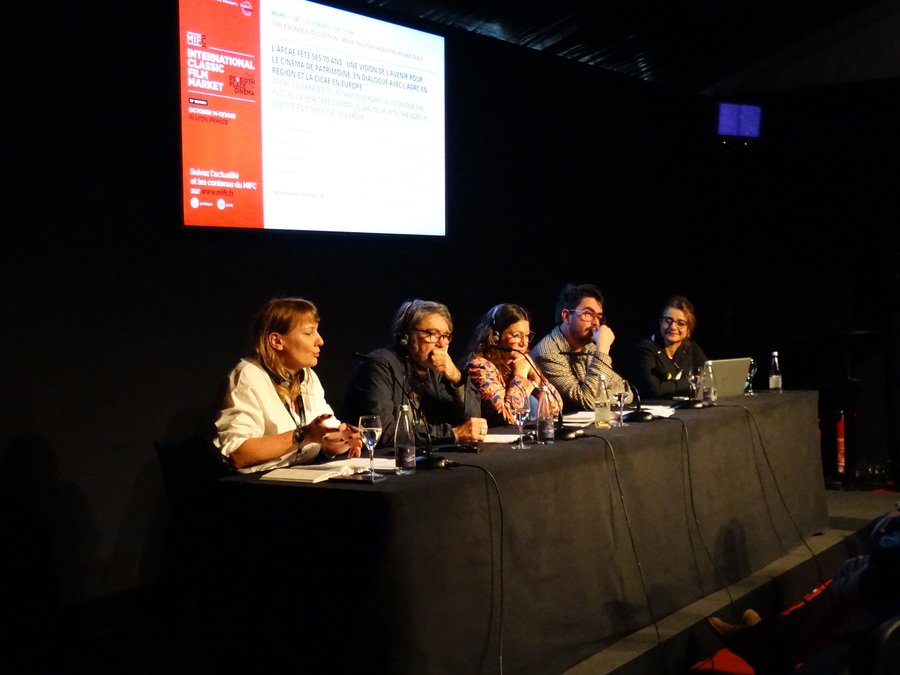AFCAE celebrates its 70th anniversary: a vision for the future of heritage cinema, in dialogue with the ADRC in France and the CICAE in Europe
On the occasion of the AFCAE's 70th anniversary, this roundtable brought together French and European cinema operators to discuss the crucial role of heritage cinema in the future of movie theaters. Moderated by Aysegül Algan (Journalist, Boxoffice Pro), the discussion benefited from the insights of Marlena Gabryszewska (CICAE, Poland), Catherine Mallet (Cinéma La Cascade, representing the ADRC), Christophe Langlade (Théâtre Cinéma Jean Carmet), and William Robin (Sceni Qua Non, member of the AFCAE's Heritage Repertoire Group). The exchanges highlighted the role of heritage as a lever for audience growth, the necessity of resource mutualisation, and the importance of mediation for transmission to new generations.

1. The Context and the Polish Experience
The programming of classic films has gained popularity in Europe, particularly since the health crisis. In Poland, repertoire cinema has helped enrich the programming offer in the face of a scarcity of contemporary films.
-
Mutualisation and Financial Support: The Polish Arthouse Cinemas Association collectively purchases licenses for classic films, drastically reducing costs for cinemas (up to a 70% reduction). It also covers ancillary costs (graphics, lectures).
-
Return on Investment: Profits from ticket sales are entirely retained by the cinemas, supporting their finances.
-
A Young and Passionate Audience: Major retrospectives (e.g., Kieślowski, Warner Bros) have achieved massive success, attracting a high proportion of young people (20-25 years old) who want to see these classics on the big screen.
-
Events and Community: Success is achieved through the creation of special events (themed evenings, costume parties) to "desacralize" the film and build a community around the work.
2. French Practices and Network Tools
French operators confirm the importance of repertoire cinema, relying on well-established regional and national networks.
-
Regular Slots and Accompaniment: It is essential to integrate heritage cinema into the editorial line (on par with documentaries or youth films), by offering regular screening slots (e.g., one Friday evening per month) and systematically supporting it with mediation (speakers, film clubs, cine-concerts).
-
Central Resources: The ADRC (Agency for the Development of Cinema in the Region) provides a rich film catalogue and support schemes for accompanied screenings to ease financial burdens.
-
AFCAE Tools: The AFCAE's Repertoire Group (French Association of Art House Cinemas) develops tools (screening notes, communication aids, upcoming film quizzes) to facilitate programming and session animation.
-
Network Logic: Associations like the GRAC allow cinemas to obtain films under better rental conditions (e.g., percentage-based rental without minimum guarantee).
3. Challenges and Impact on the Future
Despite the enthusiasm, heritage programming remains a challenge requiring collective resources and adjustments.
-
Obstacles: License costs (even if negotiable), the need for greater energy and human resources for mediation, and the difficulty of finding space for it amidst the pressure of new releases.
-
Heritage as a Space for Freedom: Repertoire cinema is the area where operators and their teams can best express their passion and create a bond with the audience, moving away from market constraints.
-
Transmission and Reference Points: Repertoire film acts as a cultural and temporal reference point for young people, offering a different and educational experience.
-
Memorable Experiences: Success is measured by intense moments of sharing (young viewers commenting on a cine-concert, family transmission) that confirm that heritage cinema is a powerful tool for renewing the audience and ensuring the sustainability of the cinema experience.




